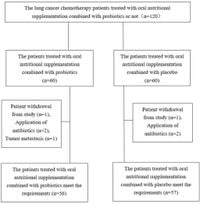In a groundbreaking study, researchers have found that oral nutritional supplementation combined with probiotics can significantly improve liver function and gut microbiota status in lung cancer patients undergoing chemotherapy. With cancer treatments often taking a toll on these patients' health, the findings provide new hope for mitigating the negative effects of chemotherapy.
This study is particularly significant as chemotherapy can create imbalances in intestinal flora that exacerbate side effects, leading to poor patient outcomes. Conducted at Yuhuangding Hospital, the research involved 113 patients diagnosed with lung adenocarcinoma, who were randomly assigned to receive either probiotic supplementation or a placebo over a 21-day chemotherapy cycle.
The intervention group, which comprised 56 patients, received a daily dose of a probiotic beverage containing 10 billion or more Lactobacillus casei strain Shirota bacterial cells, while the control group of 57 patients received a placebo. Both groups maintained similar dietary and treatment plans, receiving the chemotherapy regimen of pemetrexed and cisplatin at the beginning of the cycle. The careful structure of this double-blinded randomized controlled trial ensured that the outcomes could be reliably attributed to the supplementation.
Significantly, results showed that the intervention group exhibited improved serum levels of liver enzymes, particularly alanine aminotransferase (ALT) and aspartate aminotransferase (AST), which were significantly lower than in the control group (P < 0.05). Furthermore, levels of endotoxin in the blood, which can indicate gut permeability issues associated with dysbiosis, were also reduced in the probiotics group. In contrast, no major changes were observed in general nutritional, immune, and blood lipid status markers, suggesting that while the probiotics significantly impacted liver function and gut health, they may not have immediately translated to broader improvements in nutritional status.
The study highlights the complex interplay between gut microbiota and overall health, particularly in the context of cancer. Probiotics, beneficial bacteria that help maintain the gut flora balance, are being increasingly recognized for their potential role in improving health outcomes for cancer patients. "We speculate that the regulation of the gut-liver axis by probiotic supplementation may contribute to these improvements," the authors reported.
Notably, the research demonstrates that this combination therapy could alleviate some of the harmful side effects of chemotherapy. A disrupted gut microbiome could catalyze inflammation and negatively affect recovery outcomes in cancer patients. The observed increase in beneficial bacteria, such as Lactobacillus acidophilus and Bifidobacterium longum, alongside a decrease in harmful microbes like Escherichia coli, underscores the potential of probiotics to restore balance within the gut.
The significance of the findings cannot be understated. Chemotherapy, while effective at targeting cancer cells, can also lead to gastrointestinal mucosal damage and negatively impact immune function. A well-balanced gut microbiota is essential for a robust immune response, making the maintenance of gut health vital for individuals undergoing such treatments.
While the improvement in liver function is promising, the authors caution that the relatively brief intervention period may not have allowed sufficient time to observe changes in nutritional and immune status. The study's design and results serve as a foundation for future research, suggesting that a larger scale, longer duration trials are necessary to confirm these findings and expand our understanding of probiotics' role in cancer care.
Future work should also focus on optimizing the types, doses, and duration of probiotic therapy in order to maximize patient benefits. As therapies evolve, integrating supportive measures like probiotics into patient treatment plans could enhance recovery and improve life quality for those battling cancer.
This study adds to the body of evidence supporting the integration of nutritional interventions in oncology, potentially influencing treatment guidelines and practices moving forward. As researchers continue to explore the gut microbiota's influence on health, findings like those from this study may pave the way for the development of novel therapeutic strategies aimed at enhancing patient outcomes in cancer treatment.




